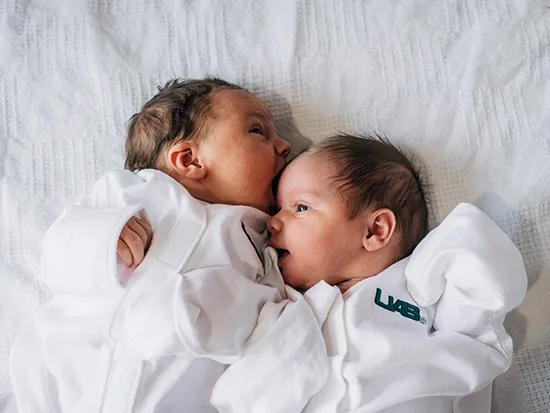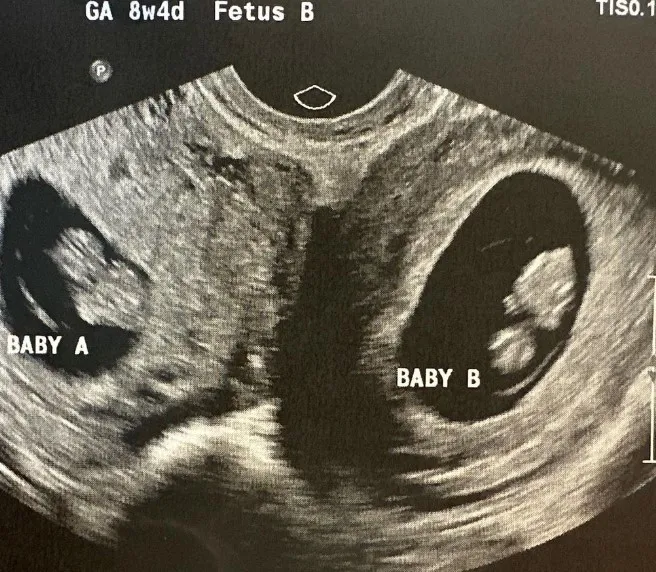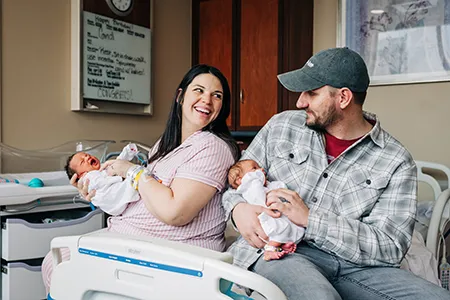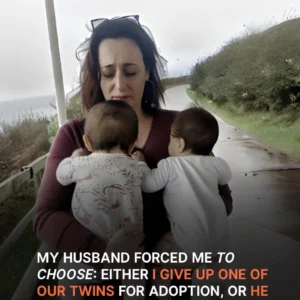A woman who garnered international headlines for having two uteruses and becoming pregnant in both has given birth to twin baby girls.
Kelsey Hatcher’s double pregnancy is considered a “one in a million” occurrence by doctors.
The Dora, Ala. resident was diagnosed at age 17 with uterus didelphys — a rare congenital anomaly that causes two uteruses to form. Only 0.3 per cent of women are impacted by this anomaly, according to a press release from the University of Alabama (UAB) announcing the birth.
Hatcher, 32, was brought to the UAB hospital on Dec. 19 for a scheduled induction at 39 weeks. After a combined 20 hours of labour, she gave birth to her daughters with her husband Caleb at her side.
Older sister Roxi, was delivered vaginally on Dec. 19 at 7:45 p.m. while younger sister Rebel, was delivered via c-section on Dec. 20 at 6:10 a.m. Both babies weighed just over seven pounds.

“Never in our wildest dreams could we have planned a pregnancy and birth like this, but bringing our two healthy baby girls into this world safely was always the goal, and UAB helped us accomplish that,” Hatcher said.
“It seems appropriate that they had two birthdays, though. They both had their own ‘houses,’ and now both have their own unique birth stories.”
This is Hatcher’s fourth pregnancy. In each of her three prior pregnancies, Hatcher only became pregnant in one uterus, so she was shocked to learn she was pregnant in both this time around.
When she went in for her initial ultrasound this year, Hatcher asked the technician to check her second uterus just to be sure.
“As soon as she moved the wand to the other uterus, I gasped,” Hatcher recounted. “Sure enough, there was another baby. We just could not believe it.”

Hatcher’s obstetrician Dr. Shweta Patel was also surprised by the ultra-rare “dicavitary pregnancy.”
“I had already taken care of Kelsey through her third pregnancy and knew she had a double uterus, but that was only one baby — two babies in two uteri were a true medical surprise,” Patel said.
According to UAB, Hatcher’s pregnancy “was routine” apart from a couple extra appointments.
“In a typical twin pregnancy, the twins share one womb, which can limit the amount of space each has, making preterm or early birth a high possibility,” said Dr. Richard O. Davis, head of maternal-fetal medicine at UAB who co-managed Hatcher’s pregnancy.
“With Kelsey’s babies, they each had their own womb, sac, placenta and umbilical cord, allowing them extra space to grow and develop.”
Hatcher also has two cervices and each uterus is attached to its own fallopian tube and ovary.

During the birth, Hatcher recalled that she felt each uterus acting independently.
“As my contractions began, they were not consistently together but were within a few seconds of each other,” Hatcher said. “I felt each side contracting in different areas as well. I felt one consistent with the monitor that started on the left side and moved to the right.”
After baby number one was delivered vaginally from the right uterus, Dr. Patel noted that Hatcher was “essentially laboring in the left uterus while simultaneously undergoing the postpartum process in the right.”
“She was having contractions with Baby B while breastfeeding Baby A.”
The second baby did not descend as anticipated for a vaginal delivery, the UAB press release notes, so Hatcher’s medical team went forward with a c-section.
A little over 10 hours after her sister was born, baby number two was welcomed into the world.
“After such a long and crazy journey, it meant the world to see both of my girls together for the first time,” Hatcher said.
Of course, the question remains whether the girls can be considered twins given they were born in different wombs and have different birthdays.
“I think it is safe to call the girls fraternal twins,” Davis said. “At the end of the day, it was two babies in one belly at the same time. They just had different apartments.”
Hatcher shared additional photos of her “miracle babies” and her medical team on Instagram.






